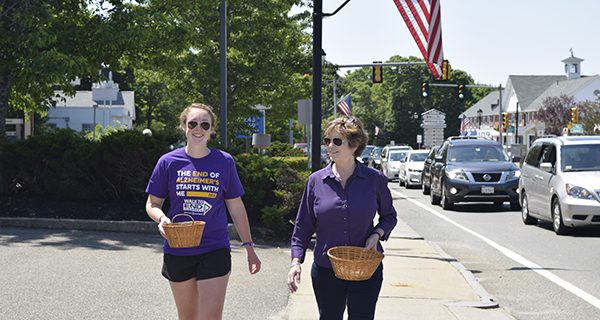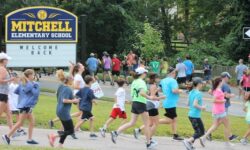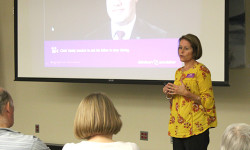[ccfic caption-text format="plaintext"]
By Christina Perrone
Hometown Weekly Intern
We all have a loved one or know someone with Alzheimer’s disease. It is a form of dementia that affects over 5 million Americans, with some even in their early 50s. As our population gets older, more and more people are diagnosed, prompting many to take action and show support for caregivers and those diagnosed.
When asked what inspired her to take action, Maimonis replied, “About six years ago, my mother was diagnosed with Alzheimer’s and to live this experience with her and to watch the decline of your mom, has been extremely challenging and difficult. And so, a few years ago, I had her live with me, so I was her full-time caretaker. She did pass away, but through the experience, I connected with so many other families, especially families with young people with early onset Alzheimer’s that are like in their early 50s. And I decided that I had to do something.”
“This is so perfect because the children can set up lemonade stands,” said Maimonis, “We don’t charge, we just ask for donations. And what we’re doing is we’re just making the town aware that there’s help.”
Abby Homiller also lead the Lemons to Lemonade event in Westwood. After her mother was diagnosed with Alzheimer’s, Homiller said, “A friend of mine who is putting up the Needham effort on this – like Needham goes purple, it’s huge – she was like: ‘You have to do a lemonade stand and you know we’re doing this and we want to get Westwood involved,’ so she hooked me up with Joan, and that’s how I got involved.”
Why is the national event called The Longest Day? According to Homiller, those suffering with this disease “don’t have that much of a sense of time, so every day is the longest day for someone with Alzheimer’s.”
Jayne Paragona, the Vice President of Development at Alzheimer's Association also came to show her support for the families participating in the fundraiser. “The Longest day is what we call our second signature event,” said Paragona. “We have the big walk to end Alzheimer’s, but this event is a national event and it’s a great event because people can do what they love and if they have a loved one who has Alzheimer’s, if they had a favorite activity – they like to knit or fish, or something – they can do that activity in honor of the person. And that person can also actually participate. A lot of times, people with Alzheimer’s, the walks are kind of difficult to go to because there’s so much going on, there’s so many people and it’s loud. So this event is just a great event for even families who have someone with Alzheimer’s that they can do an activity that the person with Alzheimer’s have and that they can also participate in.”
All proceeds raised go to the Alzheimer’s Association, which not only supports cutting edge research, but supports families as well with education programs, advocacy efforts and services. “We offer care consultations for families, a lot of times have no idea, they go and they get a diagnosis – and a lot of times they don’t even get a diagnosis – so part of our job, also, is educating physicians,” said Paragona.
The Massachusetts/New Hampshire chapter of the Alzheimer’s Association is currently trying to pass a bill at the State House that would require physicians to have a continuing education credit that they would need to take about Alzheimer’s.
“So we’re educating not only physicians,” said Paragona, “We’re educating people of the warning signs of Alzheimer’s, but then when a person gets a diagnosis, we’re trying to get them to call our organization to speak and help them.”
“We’re extremely grateful to all of the residents and families who came by and supported our cause and are very grateful to all of the families that devoted a few hours today to volunteer,” said Maimonis.
If you have a loved one with Alzheimer’s and would like to get involved, it is never too late.
“We are definitely going to do this annually, and we welcome anybody who would like to participate to let us know immediately,” said Maimonis.


























